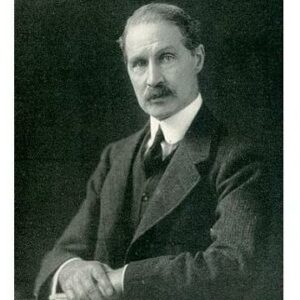Andrew Bonar Law, nicknamed as the ‘Unknown Prime Minister,’ was a British Conservative Party politician and Prime Minister. He represented a half-way point in the modern Conservative Party’s evolution. He rose through the ranks of politics thanks to his dedication and hard work, and he put his business skills to good use in encouraging better organization and efficiency. He began his career as a businessman before being asked by the Conservative Party to represent them in elections. He was a unique member of the party in that he did not pursue power or aspire to become the party’s leader. As a member of the party, his main goal was to carry out political decisions while keeping the welfare of society in mind, and to make a substantial contribution to the party’s unity. In his illustrious career, he held a number of critical posts and was a valuable addition to the party. He returned to politics after retiring from the party to back his party’s choice to appoint him as Prime Minister of the United Kingdom. However, as his health deteriorated, he was forced to retire from this position. He is regarded as the ‘Unknown Prime Minister’ because of his brief time as Prime Minister, which lasted only a few months.
Childhood and Adolescence
He was born in Kingston, New Brunswick, on September 16, 1858. Reverend James Law, a Free Church of Scotland preacher, and his wife Eliza Kidston Law He had three brothers and a sister: Robert, William, and John.
Janet, his mother’s sister, came from Scotland to live with them and look after the children after his mother died in 1861. She stayed with them until 1870, when his father remarried and his new wife assumed her responsibilities.
Janet offered that Bonar come and live with her family for better future possibilities as she prepared to return to Scotland. This was approved by both James and Bonar, and the boy was sent away with his aunt.
He was enrolled in Gilbertfield School when he arrived in Glasgow. With the help of his strong recall, he was sent to Glasgow’s High School in 1873, where he excelled in Greek, German, and French. Despite his academic excellence, it was clear early on that he was better suited to business than education. He dropped out of school at the age of 16 to work as a clerk at Kidston & Sons, a family merchant bank.
Career of Andrew
The Kidston brothers retired in 1885, and their bank amalgamated with the Clydesdale Bank. Bonar borrowed money from the retiring brothers to join a partnership in a Glasgow iron merchants concern. The firm prospered over time as a result of his managerial efforts and tireless hard work.
In 1897, he was nominated by the Conservative Party to run for the Glasgow Bridgeton constituency. Later, after great convincing, he was offered the Glasgow Blackfriars and Hutchesontown seat, which he accepted.
In the general elections of 1900, he defeated his Liberal Party opponent and distinguished himself via his oratory and wit. As a result, he was elected to the legislature.
Law was appointed Parliamentary Secretary to the Board of Trade in 1902, when Prime Minister Arthur Balfour established his government. Throughout his political career, he was a strong proponent of tariff reform.
The Conservative Party was divided over tariff reform, and Arthur Balfour resigned as Prime Minister in December 1905. The new Prime Minister, Liberal Henry Campbell-Bannerman, dissolved parliament and called general elections right away.
Despite a strong campaign, Law was defeated in the election. Later that year, he won a by-election in Dulwich and was re-elected to the House of Commons. After Arthur Balfour resigned as Conservative Party leader in 1911, he became the new leader. He focused his emphasis as the Party’s leader on two issues: tariff reform, which he supported, and Irish Home Rule, which he firmly opposed.
Herbert Asquith was appointed Secretary of State for the Colonies and a member of the War Committee in 1915, when a coalition administration was formed. Bonar served as the Chancellor of the Exchequer in David Lloyd George’s cabinet after he succeeded Asquith in 1916. As a result, he became Lloyd George’s second-in-command.
He stepped down as Conservative Party leader in March 1921, but when David Lloyd George was dismissed from office in October 1922, he accepted to become Prime Minister despite his failing health.
Due to his failing health, he was obliged to resign from his position in May 1923.
Personal History and Legacy
He met Annie Pitcairn Robley, daughter of a Glaswegian trader, Harrington Robley, after establishing himself successfully. They fell in love quickly and married in 1891. They had five sons and two daughters, the first of whom was stillborn. Annie died in 1909, and he was devastated for years. Despite his youthful age and successful career, he never remarried.
His third son, a soldier named Charlie Law, was killed in the Second Battle of Gaza in 1917. His eldest son, a pilot, was shot down and killed the same year. He was crushed by these dreadful events.
He was diagnosed with fatal throat cancer while Prime Minister of the United Kingdom and died on October 30, 1923 in Kensington, London, UK. His funeral took place at Westminster Abbey, and his ashes were later interred there.
Estimated Net Worth
The estimated net worth of Andrew Bonar Law is not available.
Trivia
In his youth, he was an ardent chess player. He eventually rose to the level of an excellent amateur player, competing against world-renowned chess masters.


